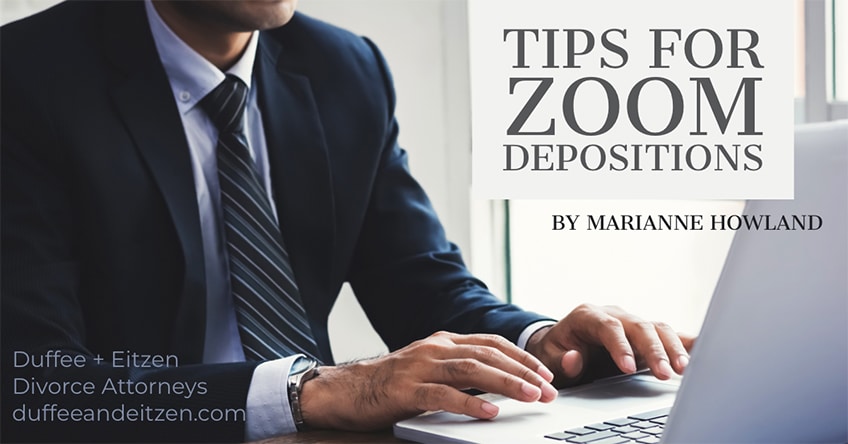Tips for Zoom Depositions by Marianne Howland

- Written by Duffee + Eitzen Administrator
- Categorised Divorce, General Tips
As we are navigating this “new normal,” litigation continues and depositions are often a necessary part of litigation.
Just because a deposition takes place over zoom does not mean that the same rules and procedures do not apply.
For example, a witness must produce any documents that are requested as part of the subpoena requiring them to appear unless their attorney has served written objections on the party requesting the documents prior the deposition date.
The rules of civil procedure governing discovery still apply to a request to a party to produce documents at a deposition. The attorney that issues the subpoena cannot use a deposition to circumvent the rules of civil procedure governing the discovery process.
The deponent will still be sworn in and the testimony may be recorded by video or stenographic means.
When preparing a party or witness for a deposition, you should ensure that you instruct them as follows:
- Do not take any substances or medications the night before or the morning of your deposition that will have any impact on your memory or your ability to understand questions asked of you.
- Do not bring any documents with you that they did not discuss with you.
- Make sure you have available with you any medication or snacks you might need to maintain your health, stamina and alertness for the day. ***Do not let anyone see your medication or see you take any medication.***
- Do not use any recording devices during your deposition.
- Do not have anyone with you.
Do not get up from your chair while you are being questioned. If you are frustrated or need something, just ask for a break. You may have to allow the attorney to finish a line of questioning and you will have to answer it, but your attorney will help you get a break fairly quickly.
- Do not answer a question if your attorney says “I am instructing you to not answer that question.” The other attorney and your attorney may go back and forth a little if that happens. Don’t worry about that exchange. Don’t answer the question and wait until the next question is asked. Do not ask anyone “Should I answer that question?” If your attorney doesn’t want you to answer a question, he or she will let you know.
- Your attorney might object to some questions. After your attorney objects, you still have to answer the question. In this manner, depositions are different from being a witness in court. Your attorney is objecting so that she can preserve the right to object later in court if they ask you the question again. Just let the other attorney and your attorney go back and forth, and then answer the question.
- Tell the truth. This is critical. You cannot lie or it will come back to bite you later.
- Only answer the question that is being asked. If you are asked about a specific issue, do not share your rationale and reasons. Just answer the question.
- Do not act like a lawyer. Do not argue with the other attorney. Do not try to outsmart the other attorney. It is a waste of time and will make you appear dishonest.
- Treat the other attorney with respect. If you are sarcastic or rude in any way it could come back to bite you. If the other attorney harasses you, your attorney will protect you.
- It is very helpful when you are seated to keep your feet on the floor and do not rock or lean in your chair. All of those things will help keep your voice steady and avoid coming across as too nervous. Please look at the other attorney when they ask you questions and when you answer them. It is important to behave like you are having a normal conversation.
- If the other lawyer is asking you specific questions about a specific document, you can answer those questions if you are very sure of your answer. However, if you think it might be even the slightest bit helpful to be looking at the document being referenced, then say “Can I see the __________(name of document) so that I can answer your questions?
- If the other party is present during your deposition, it is very possible that they will engage in conduct that distracts and annoys you. For example, some people make odd facial expressions, try to intimidate, sigh, laugh, shake their heads, whisper to their attorney, and take a lot of notes. The absolute best thing you can do in response to any of this conduct would be to act like you do not even notice it. If it becomes clear that you are distracted or annoyed, the inappropriate conduct will likely increase. If the conduct is frightening or harassing and you cannot ignore it, you can say to the other attorney: “I am struggling to focus on your questions because your client is _____________ and it is incredibly distracting. Could I ask you to please address that?” The other lawyer may or may not address it. But we find that the conduct normally decreases some after this type of exchange.
- It is not unusual for attorneys to take a break to speak to each other off the record. If that happens, your attorney will ask you if you need a break.
- Depositions get cancelled quite often. Sometimes they get cancelled right beforehand. It is not against the rules, so some unethical attorneys schedule a deposition for the purposes of harassment, but never intend to actually go forward with the deposition. There is nothing that can be done about this at the time.
- Some witnesses get very nervous before their deposition, get sick to their stomachs, lose sleep, etc. That is perfectly understandable. However, it is a mistake to cancel your deposition or not show up. The judge has heard all of the typical excuses. Please plan for the stress accordingly. Also, please make sure you have a plan for childcare in case you have a sick child on the day of your deposition.
- Dress appropriately.
While conducting litigation via Zoom has brought a casual element to litigation, it is important that we take it seriously and advise our clients to, as well. With these tips you and your client or witness should have a successful deposition.
About the Author
Marianne Howland, a partner at Duffee + Eitzen, has been practicing family law for over ten years. She graduated from Texas A&M University School of Law in 2006. Since graduating, she has handled cases ranging the entire spectrum of family law from adoptions, custody battles, pre and post-nuptial agreements, to divorces and post-divorce modifications and enforcement. She is very comfortable in the courtroom litigating her client’s case. However, she encourages clients to settle their issues amicably when possible. Prior to joining Duffee + Eitzen, she had her own law practice for 10 years.
She has two small children and has personally been through a divorce. She brings these experiences to every case and has compassion and knowledge that assists her in her representation of each of her clients. This experience allows her to give her clients the kind of attention and advocacy they deserve.


Contact Us